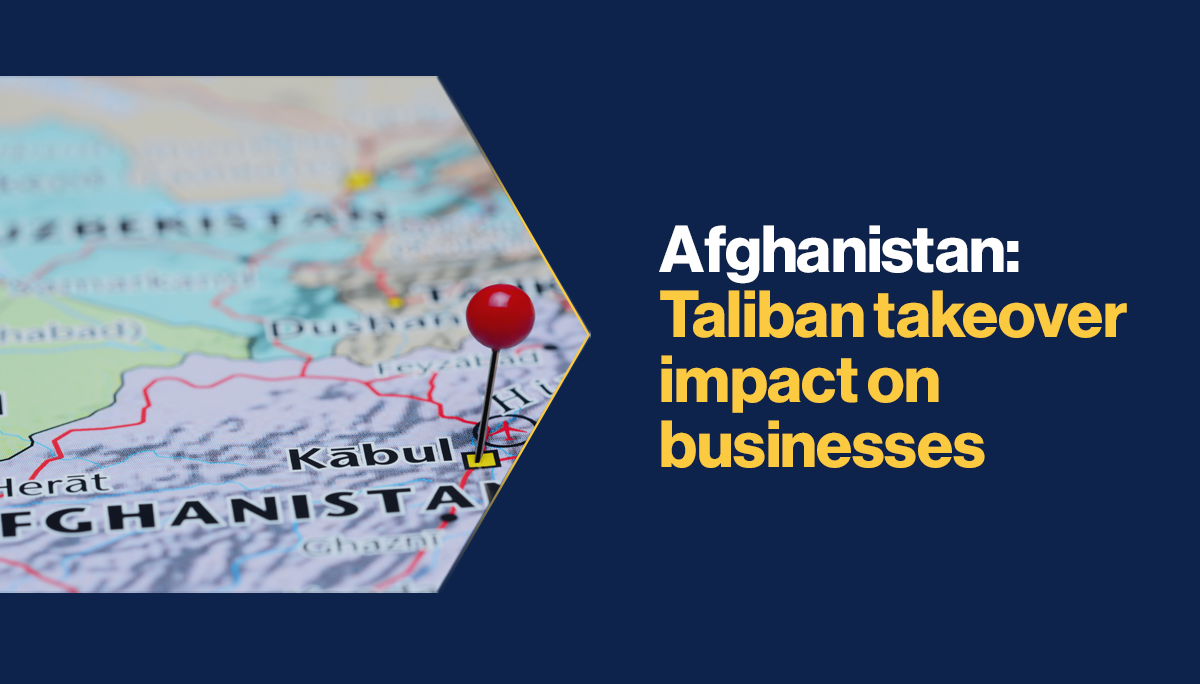Afghanistan: Taliban takeover impact on businesses

Chaotic scenes have been reported at Kabul International Airport with many Afghans trying to flee the country. Images of civilians on the runway, trying to climb aboard moving aircrafts, have seen the complete shut down of commercial travel to the capital, with only the military side of the airport now functioning.
The Taliban takeover is having a domino effect on Afghanistan from a political, social, and economic perspective. The Taliban ‘coupe’ is making it hard for local businesses to keep operating as it is causing major disruptions to trade, supply chains, transportation, and import & export.
Air routes (the main source of transportation for exports) have been restricted to military flights only and neighbouring countries have closed their borders in fear of a mass exodus.
Local businesses and international organizations trading in and with Afghanistan will have to adapt to a new political environment where rules and regulations will change drastically; skilled workforce will be difficult to find; current foreign business relationships (with clients and/or suppliers) will most likely end; and providing security for their staff and customers will be difficult.
Foreign workers fleeing the country due to security concerns has also paused the business activities as companies now focus on restructuring and relocating staff; while local shop keepers have abandoned their shops, emptying their shelves out of fear of looting from fighters stationed around the city.
According to Forbes, major infrastructure projects (and opportunities for local businesses) are also at risk. For example, the construction of the Turkmenistan-Afghanistan-Pakistan-India gas pipeline (TAPI), a project that was finally revived in 2018, will likely be stopped. The CASA-1000 project designed to export hydro-power from energy-rich Central Asia to energy-poor South Asia via connected electric grids. And a railway construction project to link Uzbekistan and Pakistan via Mazari-Sharif and eventually Kabul and Peshawar.
The public sector is also struggling in terms of human resources. Civil Servants have been hiding in their homes as they fear going back to work. Taliban commander has been personally calling Civil Servants to return to work, as Taliban fighters searched from door to door for absentee workers.
On Tuesday, the new Taliban government have pushed to restart Kabul and told civil servants to return to work. The mayor and the ‘new’ minister of public health were among those who returned to their jobs. Aljazeera also reported that as traffic police were back on the streets, some shops also were reopened.
The financial sector is also very much in chaos; bank owners and traders fear for their lives and businesses’ transactions, while crowds of people have been withdrawing money from their accounts. There is a general lack of trust on the future of Afghanistan’s financial system where financial operators fear for their physical safety and customers do not feel that their money is safe.
With the country reliant on foreign aid and international support, the political uncertainty runs the risk of losing foreign investment. The impact of the loss of income could be devasting for the country, and with real uncertainty as to how the Taliban intend to govern the country, or when they are likely to be able to trade again unknown, many fear there could soon become a humanitarian crisis.
On the other hand, new relationships with countries like China and Russia will bring new investments for the Afghan economy. Indeed, Afghanistan’s natural resources could be attractive to international business – but this is only if corruption and security issues are under control.
The next few weeks will be crucial for organizations and people in Afghanistan. As the new Taliban government announced that it will be more “moderate than when it imposed a brutal rule in the late 1990s”; it will be interesting to see how they lay out the new political and economic environment for organizations to start operating in.
































